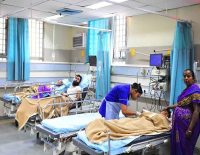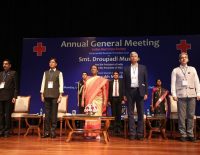23% girls leave school after reaching puberty due to lack of menstrual hygiene facilities

“The effectiveness of menstrual hygiene management continues to be an area that receives less than the desired attention. The National Family Health Survey indicates that around 22.7% of women in India do not use hygienic methods for menstrual protection. Lack of access to menstrual hygiene facilities contributes to school absenteeism among girls, with around 23% dropping out of school after reaching puberty”, said Anil Rajput, ASSOCHAM National CSR Council Chairperson. He was speaking on the ocassion of Menstrual Hygiene Management Conclave.
Mr Rajput underlined that to address the issues, Government of India has been running a scheme for promotion of menstrual hygiene among adolescent girls in the age group of 10-19 years in rural areas. However, amidst these challenges, there’s a growing recognition of the need for innovative and impactful solutions to address menstrual hygiene effectively”
Speaking on the need to create awareness and address the various taboos around this subject, Anil Rajput said: “Over the years, recognising the crucial need to break the silence and raise awareness about menstrual hygiene practices, as well as to combat menstrual stigma and create a supportive environment where every woman and girl can manage her menstruation hygienically, ASSOCHAM has been consistently organising conferences on the different aspects of menstrual health and awareness”.
Anil Rajput also underscored the need to double down on efforts in addressing the various facets of menstrual health and hygiene, He emphasized that “By highlighting exemplary efforts in this area, ASSOCHAM seeks to foster a supportive environment for menstrual health and hygiene, involving various stakeholders including businesses, NGOs, and government bodies. Let’s all redouble our efforts towards menstrual awareness and health and contribute towards building an even more resilient, participatory and powerful India.”
Former Lieutenant Governor of Puducherry, Dr. Kiran Bedi who was the chief guest at the event called upon stakeholders to conduct extensive research to strengthen the Menstrual health management system. She also made an appeal to all the awardees to join hands and identify areas in their region to work together and address this issue by creating a mass movement on this critical subject impacting a large number of girls and women in our country.
Addressing the Menstrual Hygiene Management Conclave, organized by ASSOCHAM in New Delhi, Dr. Bedi said that policy intervention is extremely pivotal and emphasized that Sanitary pads are also a necessity for women just like water and gas. Talking about the access to menstrual products in prisons, she expressed concern over the issue and called for immediate action.







